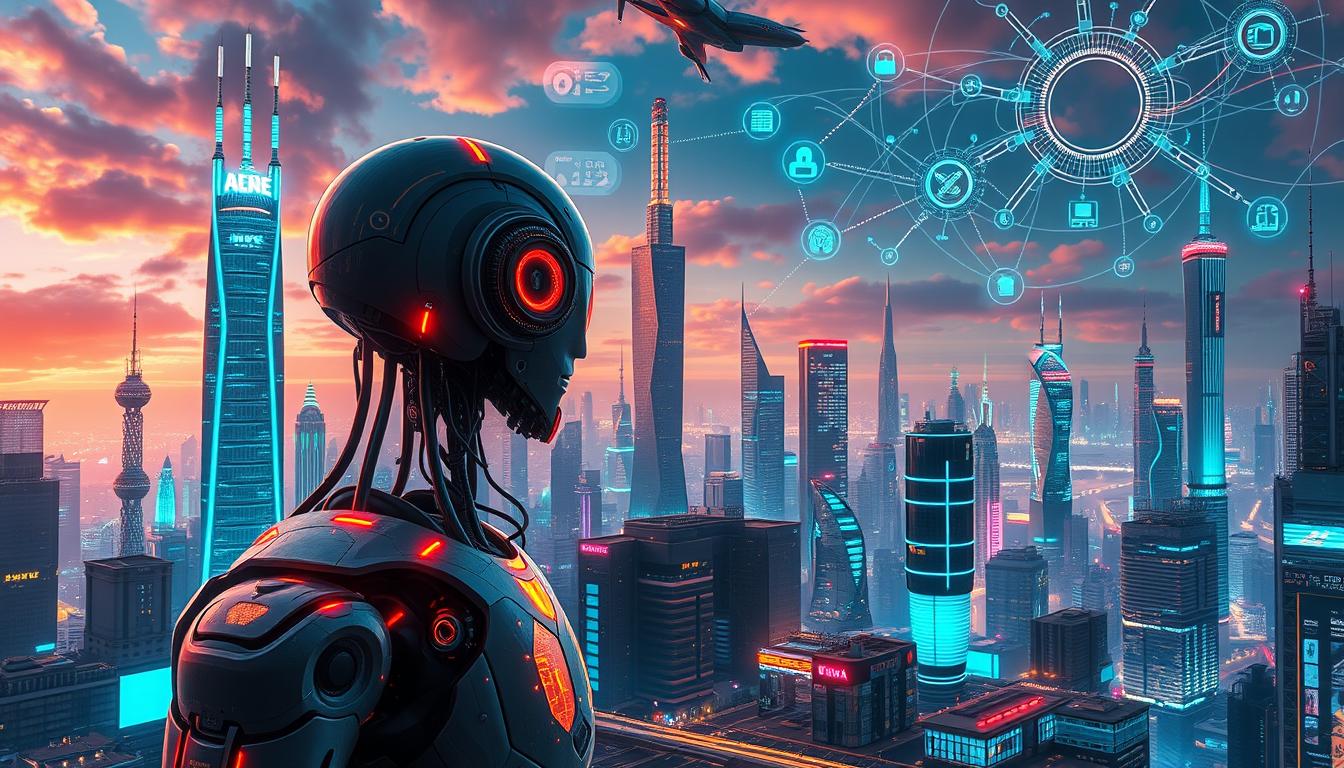![]()
Top 10 CS Specializations for AI Careers in India
“The future of artificial intelligence is not just about machines, but about the humans who imagine what’s possible and bring that vision to life.” – Satya Nadella, CEO of Microsoft.
In the rapidly evolving landscape of technology, the field of Artificial Intelligence (AI) has emerged as a beacon of innovation. It is transforming industries and revolutionizing our interaction with the world. As India solidifies its position as a global hub for technological advancements, the demand for skilled professionals in AI-related domains has skyrocketed. This article explores the top 10 best Computer Science specializations that can unlock a future in the thriving field of AI in India.
 Key Takeaways
Key Takeaways
- Explore the top 10 Computer Science specializations that can lead to successful AI careers in India.
- Discover the cutting-edge technologies, such as machine learning and deep learning, that are shaping the future of AI.
- Understand the emerging domains, including natural language processing and computer vision, that offer promising opportunities in the AI landscape.
- Gain insights into the growing demand for AI-related skills and the potential for career growth in this dynamic field.
- Prepare yourself for the AI-driven future by aligning your educational and professional pursuits with the most promising specializations.
Unveiling the Future: AI Specializations Unlocking Opportunities
The digital realm’s evolution has heightened the need for AI professionals. Specializations in machine learning, deep learning, and neural networks are pivotal. They are the driving force behind AI’s transformative power, opening up a future of immense potential.
AI’s applications are vast, from enhancing customer experiences to streamlining complex business processes. Experts in these fields are at the forefront of shaping tomorrow’s technological landscape.
Machine learning stands out as a highly sought-after specialization. It involves creating algorithms and statistical models for systems to perform tasks autonomously. Through data analysis, machine learning uncovers insights and patterns, aiding organizations in making informed decisions.
Deep learning is another transformative field. Inspired by the human brain, it uses artificial neural networks to solve complex problems. It has revolutionized how machines interact with and understand the world, from natural language processing to computer vision.
At the core of these fields lies algorithmic reasoning. This discipline focuses on developing logical algorithms and computational models for efficient problem-solving. Professionals skilled in algorithmic reasoning are crucial for building intelligent systems that drive the AI revolution.
| Specialization | Application | Key Skill |
|---|---|---|
| Machine Learning | Predictive analytics, personalized recommendations, fraud detection | Statistical modeling, data preprocessing, algorithm development |
| Deep Learning | Image recognition, natural language processing, autonomous systems | Neural network architecture, deep learning frameworks, feature extraction |
| Algorithmic Reasoning | Optimization, decision-making, problem-solving | Computational complexity analysis, algorithm design, logical reasoning |
The world is embracing AI’s transformative power, making these specialized fields crucial. By mastering these domains, professionals can unlock a future where humans and machines collaborate. This collaboration will drive technological advancements and open up boundless opportunities.
“The future of artificial intelligence is not about computers replacing humans, but about humans and computers working together to solve problems and create new possibilities.”
Top 10 Best Computer Science Specializations for a Future in AI
The world is witnessing a revolution with Artificial Intelligence (AI) at its core. This has led to a significant increase in the need for experts in this field. Among the numerous computer science specializations, machine learning and deep learning are at the forefront, driving AI’s rapid progress.
Machine Learning: The Driving Force Behind AI
Machine learning is a crucial part of AI, allowing systems to learn and improve over time. It employs statistical methods to identify patterns, predict outcomes, and solve complex issues with growing precision. Its applications span from predictive analytics to tailored recommendations, reshaping various sectors.
Deep Learning: Exploring the Depths of Artificial Intelligence
Deep learning, an advanced form of machine learning, uses artificial neural networks to solve complex problems with unmatched accuracy. It mimics the human brain’s architecture and algorithmic reasoning, enabling models to learn from vast datasets. This has transformed fields like computer vision, natural language processing, and robotics.
These specializations are pivotal in AI’s rapid evolution, driving innovation and reshaping industries worldwide. As the need for AI-driven solutions escalates, excelling in these fields can unlock a plethora of career prospects in the future.
“The future of AI is not about replicating human intelligence, but about augmenting and complementing it.”
Natural Language Processing: Bridging the Gap Between Humans and Machines
In the realm of Artificial Intelligence (AI), natural language processing (NLP) stands out as a pivotal area. It enables machines to grasp, decode, and create human language, thus bridging the divide between humans and technology. Applications like chatbots, language translation tools, and sentiment analysis are transforming our communication with technology. This makes NLP a highly coveted field within the AI sector.
NLP harnesses artificial intelligence to dissect, comprehend, and generate human language. This allows for more natural and intuitive interactions between humans and machines. Through processing and understanding natural language, NLP-based systems can engage in meaningful dialogues, translate languages, and even discern the sentiment and emotions behind written or spoken words.
- NLP enables machines to understand and respond to natural human language, rather than requiring rigid, predefined commands.
- This specialization is crucial for developing intelligent assistants, language translation tools, and advanced text analysis applications.
- NLP-powered technologies are transforming industries, from customer service and e-commerce to healthcare and finance, by enhancing user experiences and automating language-based tasks.
“Natural language processing is the foundation for how we interact with technology in a more natural, intuitive way.”
As the need for seamless human-machine interaction escalates, NLP remains at the vanguard of AI innovation. By excelling in this field, professionals can unlock a plethora of opportunities in the rapidly evolving AI landscape. This drives the advent of technologies that bridge the gap between humans and machines.

Computer Vision: The AI Eye for Visual Understanding
In the realm of Artificial Intelligence, the field of computer vision has emerged as a crucial specialization. This technology enables machines to interpret and understand digital images and videos. It powers a wide range of applications, from facial recognition to autonomous vehicles.
At the heart of computer vision lies the ability to process and analyze visual data. Through advanced algorithms and neural networks, AI systems can identify objects, detect patterns, and make sense of the world around them. This has far-reaching implications, from enhancing medical imaging analysis to revolutionizing industries like manufacturing and logistics.
Robotics: AI in Motion
Closely related to computer vision is the field of robotics, which combines AI algorithms with physical systems to create intelligent, autonomous machines. The integration of AI and robotics is transforming industries, from manufacturing to healthcare, and is a highly promising area for future careers.
Robotic systems equipped with computer vision and AI-powered decision-making capabilities are enabling machines to perform tasks with unprecedented precision, speed, and adaptability. This has opened up new possibilities in fields as diverse as space exploration, disaster response, and assisted living.
| Application | Impact of Computer Vision and Robotics |
|---|---|
| Manufacturing | Increased efficiency, reduced errors, and enhanced quality control |
| Healthcare | Improved medical imaging analysis, robotic-assisted surgery, and remote patient monitoring |
| Autonomous Vehicles | Enhanced safety, reduced accidents, and more efficient transportation |
As the fields of computer vision and robotics continue to evolve, they are poised to redefine the way we interact with and perceive the world around us. They pave the way for a future where artificial intelligence is seamlessly integrated into our daily lives.

Data Science: Unlocking the Power of Data for AI
In the realm of Artificial Intelligence (AI), data science emerges as a critical specialization. AI applications heavily rely on data for training models, predictions, and decision-making. Thus, data scientists, skilled in statistical analysis, machine learning, and data visualization, are crucial for developing advanced AI solutions.
Data science is the cornerstone of AI, focusing on extracting insights from vast data sets. Advanced analytical techniques and algorithms enable data scientists to uncover patterns, trends, and correlations. These insights are used to create AI models capable of solving complex problems and unlocking new possibilities across various industries.
Data science is driving AI-driven breakthroughs in healthcare, finance, retail, and transportation. It’s transforming how we live and work. By combining data with AI’s intelligence, data scientists are creating a future where machines can learn, adapt, and make decisions like never before.
The AI-Data Science Synergy
The relationship between data science and artificial intelligence is symbiotic and interdependent. Data science fuels AI systems, while AI enhances data science capabilities. This synergy has led to cutting-edge AI applications tackling complex challenges with unprecedented accuracy and efficiency.
- Data scientists harness the power of machine learning, deep learning, and natural language processing to extract meaningful insights from large, unstructured datasets.
- These insights are then used to train AI models, which can make predictions, automate decision-making, and generate new knowledge.
- The feedback loop between data science and AI creates a continuous cycle of innovation, where each field informs and enhances the other, leading to exponential advancements in both areas.
| Key Aspects of Data Science for AI | Contribution to AI |
|---|---|
| Data Collection and Preprocessing | Ensures high-quality, relevant data for AI model training |
| Statistical Analysis and Modeling | Develops the underlying algorithms and mathematical foundations for AI systems |
| Machine Learning and Deep Learning | Enables AI models to learn and make predictions from data |
| Data Visualization and Communication | Helps stakeholders understand and interpret AI-driven insights |
As AI-driven solutions demand grow, data science’s role in AI careers becomes increasingly vital. Mastering data science opens a world of possibilities for aspiring AI professionals. It enables them to contribute to shaping an AI-powered future.
Conclusion: Paving the Path to an AI-Driven Tomorrow
The journey towards an AI-driven future is marked by vast potential and promise. At the core of this transformation are disciplines like machine learning and deep learning. These are complemented by emerging fields such as natural language processing, computer vision, and robotics. These areas are at the vanguard of the AI revolution, reshaping industries and our interactions with technology.
Investing in these specialized skills places aspiring tech professionals in India at the epicenter of the artificial intelligence landscape. They become pivotal in driving innovation and advancing this transformative technology. Through the mastery of data science, the development of sophisticated neural networks, and the application of algorithmic reasoning, these specializations unlock a plethora of opportunities. They empower individuals to design a future where AI is an integral part of our everyday lives.
The future is bright, with endless possibilities unfolding before us. The collaboration of the brightest minds in Computer Science will continue to redefine what is achievable. By embracing these specializations, the next generation of tech professionals in India will be instrumental in shaping a future that is intelligent, efficient, and profoundly transformative.
FAQ
What are the top Computer Science specializations for a career in Artificial Intelligence?
For a career in Artificial Intelligence, the top Computer Science specializations include machine learning, deep learning, and natural language processing. Also, computer vision, robotics, and data science are crucial areas of focus.
How can machine learning and deep learning unlock opportunities in the AI field?
Machine learning and deep learning are foundational to Artificial Intelligence. They allow systems to learn and enhance their capabilities over time. These areas are driving significant progress in AI and are highly sought after across various sectors.
What is the role of natural language processing in Artificial Intelligence?
Natural Language Processing (NLP) is a vital specialization in Artificial Intelligence. It enables machines to comprehend, analyze, and create human language. NLP is behind applications like chatbots, language translation tools, and sentiment analysis, transforming our interactions with technology.
How does computer vision and robotics contribute to the field of Artificial Intelligence?
Computer Vision empowers machines to decipher and understand digital images and videos. This technology underpins applications such as facial recognition and autonomous vehicles. Robotics, which merges AI algorithms with physical systems, is revolutionizing sectors from manufacturing to healthcare. It represents a highly promising field for future careers.
What is the importance of data science in the context of Artificial Intelligence?
Data Science is indispensable for a future in Artificial Intelligence. It involves extracting insights and knowledge from large datasets. AI applications heavily depend on data to train models, predict outcomes, and inform decision-making. Experts in statistical analysis, machine learning, and data visualization are vital in crafting advanced AI solutions.
 Key Takeaways
Key Takeaways












